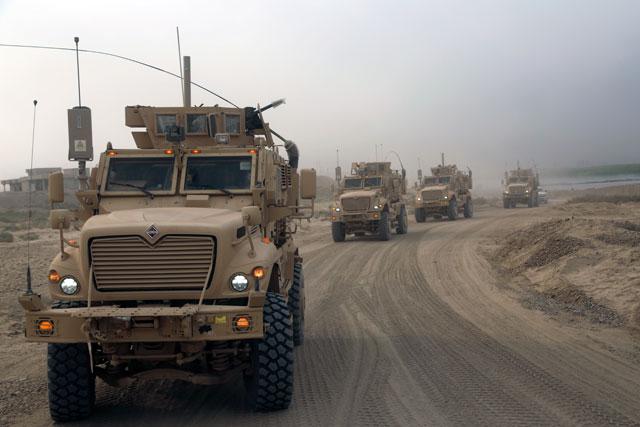You are here
Iraq lawmakers approve interior, defence ministers
By AP - Oct 18,2014 - Last updated at Oct 18,2014
BAGHDAD — Iraqi lawmakers approved Prime Minister Haider Al Abadi’s remaining Cabinet nominees on Saturday, including for the critical defence and interior portfolios, completing the formation of a government that will strive to push the Islamic State (IS) extremist group out of the sprawling territory it has seized in recent months.
Control over the two powerful security ministries has long been a source of tension among Iraq’s feuding political factions. The US and other allies have been pushing for a more representative government that can reach out to Sunnis, who felt marginalised by former Iraqi prime minister Nouri Al Maliki. Sunni discontent is widely seen as having fuelled the IS group’s dramatic advances in Iraq since June, when it captured the country’s second largest city Mosul.
Khaled Al Obeidi, a Sunni lawmaker from Mosul, was selected for the post of defence minister, by a vote of 175-85. He had served as an officer in Saddam Hussein’s military and holds a PhD in political science.
Mohammed Salem Al Ghabban, a Shiite lawmaker with Abadi’s State of Law political bloc, was approved as minister of interior by a 197-63 vote. He holds degrees from universities in both Tehran and London and he is currently pursuing a PhD in political science in Baghdad. He was a long-time opponent of Saddam and was detained in 1979.
Hoshiyar Zebari, a Kurdish politician and Iraq’s long-serving foreign minister, was named minister of finance, having previously been voted in as deputy prime minister. Shiite lawmaker Adel Fahd Al Shirshab was named tourism minister, and Kurdish lawmaker Bayan Nouri was appointed minister of women’s affairs.
Iraq is facing its worst crisis since the 2011 withdrawal of US troops, with the IS in control of about a third of the country.
Iraq’s US-trained and equipped armed forces collapsed in the face of the militants’ advance, abandoning heavy weapons that the extremist group is now using in battles across both Iraq and Syria.
Many have blamed the army’s poor performance on Maliki, saying he replaced top officers with inexperienced or incompetent political allies in order to monopolise power.
From 2010 until his resignation in August, Al Maliki had held both the interior and defence portfolios, in part because lawmakers could not agree on nominees for them.
The US began launching air strikes against the Islamic State group in August and along with Western allies has provided aid to Iraqi forces and Kurds fighting in the north. But Washington has repeatedly called on Baghdad to reach out to the Sunni and Kurdish minorities, saying only a unified Iraqi government can defeat the extremists.
US Secretary of State John Kerry called the completion of the Iraqi government a “very positive step forward”.
“These were critical positions to be filled in order to assist with the organising effort with respect to ISIL,” Kerry told reporters in Boston on Saturday.
The State Department praised the move in a statement, saying the ministers “represent the diversity of Iraq, and complete an inclusive Cabinet”.
Iraqi lawmakers expressed hope that the new government would help boost morale among troops in the field.
“I think that the security situation will improve after the selection of the two ministers, because now troops know that when they fight, the whole country and all the political blocs are supporting them,” said Rsoul Radhi, a Shiite lawmaker from Al Abadi’s bloc.
“All security and political efforts should now be directed toward retaking the territories held by Daesh,” he added, using an Arabic acronym for the Islamic State group.
Lawmakers approved most of Abadi’s Cabinet on September 8 and officially voted him in as prime minister, bringing a formal end to Al Maliki’s eight-year rule, but Abadi requested a delay in naming defence and interior ministers because lawmakers had not agreed on his proposed candidates. Candidates put forward on September 16 were rejected by parliament.
“Security issues should now be the priority for Iraqi officials and politicians who showed today they are aware that political wrangling will lead the country nowhere,” said Kurdish lawmaker Perwan Muslih. “All efforts should be directed toward the common enemy.”
Related Articles
The Iraqi government has identified and stopped payment of tens of millions of dollars in salaries previously disbursed to nonexistent troops, known here as "ghost soldiers", as part of the prime minister's vow to tackle corruption in the military and regain a foothold in the battle against IS (IS) group, two senior government officials said.
BAGHDAD — Iraq's parliament voted unanimously on Monday to bar the government from passing important reforms without its approval in an effo
BAGHDAD — Iraq's security forces continue to gear up for a long-awaited operation to retake the Daesh-held city of Mosul.
















